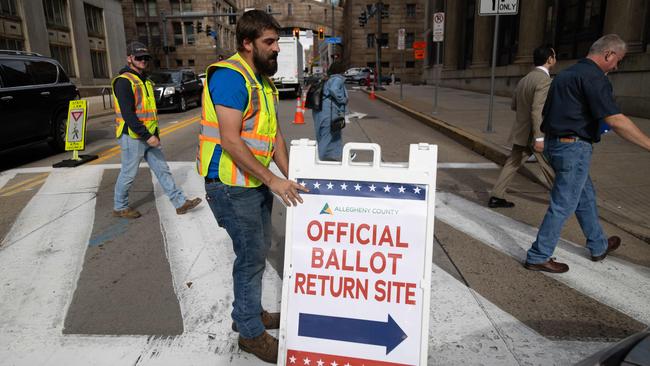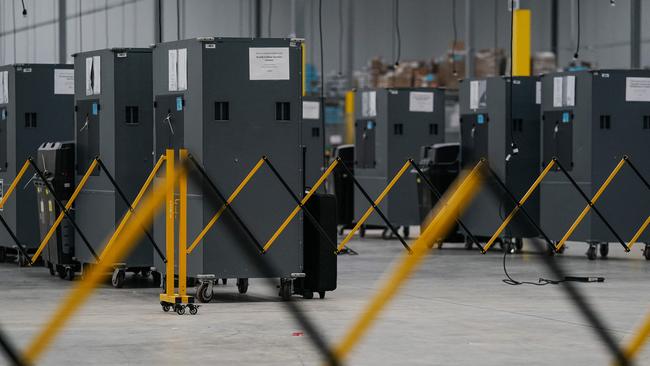Lawyers get ready to challenge results of US election
Donald Trump is readying a series of legal challenges to contest the results of the election should Kamala Harris win what polls indicate will be a tight race.

Donald Trump is readying a series of legal challenges to contest the results of the election should Kamala Harris win what polls indicate will be a tight race.
Both campaigns have spent months preparing for post-election courtroom fights, drafting potential lawsuits and responses.
Mr Trump and his allies have already started to claim that there is no verification for overseas or military ballots, that election officials are using early voting to commit fraud and that piles of postal ballots in swing states are illegitimate to sow distrust in the vote.
“The question isn’t whether they’re going to bring these claims, the question is whether the court is going to even give them the slightest time of day,” said David Becker, executive director of the Centre for Election Innovation & Research, a nonpartisan group that promotes election security.
On Mr Trump’s side, veteran election lawyer Gineen Bresso is leading hundreds of lawyers working on the Republican Party’s so-called election integrity efforts.
The Democrats have vastly expanded their legal team in the past four years, with 400 lawyers on staff, including two former US solicitor-generals, and 10,000 more on call across the 50 states, working on legal drafts to scenarios that could arise.
“They have started earlier and we have started earlier too. We never stopped preparing since 2020,” Dana Remus, who is leading the Harris legal operation, told The Wall Street Journal.
“As soon as (the Republicans) file a case, as soon as they start saying election results can’t be trusted, we are prepared to respond.”

For the most part the Democrats have been on the defensive. They have launched a few legal moves of their own, including in the swing state of Georgia, where they successfully contested new rules from the pro-Trump election board that could have given that body more power.
Pennsylvania, where its 19 Electoral College votes make it the most important battleground, is shaping up to be the centre of any legal storm this year.
The state’s unusual voting laws make it ripe for rigged election claims. It does not have early voting – it offers time-consuming on-demand mail balloting instead – and does not process postal ballots before election day, which often leads to delays.
“We should expect a spate of local litigation throughout the state in the immediate aftermath of the election, not because those suits are meritorious, but because Pennsylvania law is rife with such opportunities,” said Michael Morse from the University of Pennsylvania Carey Law School.
Mr Trump’s campaign has repeatedly portrayed the long queues for on-demand mail-in ballots in Bucks County, which includes some of Philadelphia’s suburbs, as a form of voter suppression.
The US Supreme Court rejected an emergency appeal from Republicans on Friday that could have led to thousands of provisional ballots not being counted in the state.
One tool the Republicans’ legal team has used is to pressure Trump supporters on county boards to try to block the certification of election results by demanding recounts, alleging voter fraud or simply voting against certification.
Experts say Pennsylvania courts have tools and legal precedents that allow them to force certification of the results if no fraud is discovered.
In Georgia, Democrats have pre-empted a repeat of 2020 when Trump urged Brad Raffensperger, the secretary of state, to “find” thousands of ballots that would have overturned Joe Biden’s victory. Judges blocked new rules devised by an election board controlled by Trump allies that could have impeded certification of results.
In another ruling in Georgia, judges rejected Republican calls for votes to be hand-counted.
In 2020 Trump and his legal team, which included Rudy Giuliani, the former mayor of New York, challenged the results on various grounds well before the final votes were counted.
After Trump declared victory in a 2am speech from the White House, the campaign filed lawsuits seeking to stop the counts in Michigan and Georgia. Later that day a third lawsuit was filed in Pennsylvania seeking to prevent voters from “curing” postal votes that lacked proof of identification.
In the days, weeks and months that followed, they unsuccessfully filed more than 60 lawsuits to try to overturn the results, often based on false claims of widespread voting fraud.
Their appeals were rejected by the Supreme Court, which is dominated by conservative justices appointed by Trump. The last three cases were rejected four months after the election.
This time round, that could mean legal challenges will be fought to the January inauguration and beyond.
The Times



To join the conversation, please log in. Don't have an account? Register
Join the conversation, you are commenting as Logout